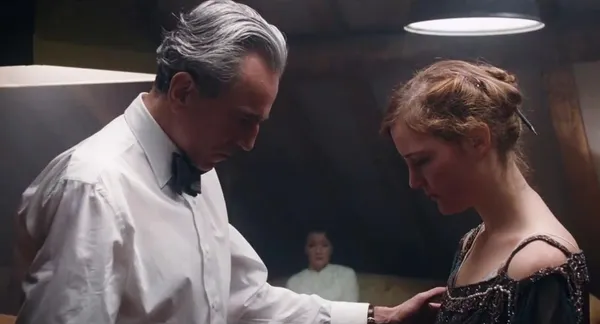Eye For Film >> Movies >> Phantom Thread (2017) Film Review
Phantom Thread
Reviewed by: Anne-Katrin Titze

If you expect Paul Thomas Anderson's latest masterpiece to be a historical costume drama set in a couture house in 1950s London, starring Daniel Day-Lewis in his self-announced swan song performance as strong-willed bachelor couturier Reynolds Woodcock, you are not completely wrong, but probably will be surprised by what the director/screenwriter has in store.
Yes, there may be references to the life of Cristóbal Balenciaga, the techniques of Charles James or the career of Charles Creed and the clothes seen on the screen are divine creations - made of Flemish lace from the late 17th century, rescued from Antwerp, or cut of shimmering silk taffeta, made for royalty of all sorts.

Phantom Thread is a film about fabric, craft, beauty, but at heart asks all the crucial, complicated questions about love. The at times torturous riddles of loving oneself through the other, and the unfathomable dilemmas of showing it. Freud said that drives come from the heart whereas, surprisingly, love comes from the belly. Alma (Vicky Krieps), the young waitress, who becomes Woodcock's model, assistant, muse, lover, and more, says he made her dreams come true. And she "had given him what he desires most in return." When asked what that was, she responds - "Every piece of me." As the story unfolds, we see that she is telling the truth.
Reynolds Woodcock is a fast driver, death is his mate while speeding through the little villages on country roads. His car's color is a variation of a shade of raspberry. He has also very clearly found the perfect knee socks, a lighter berry shade than the car, smooth and silky like the ones worn in the Vatican. I admit to experiencing sock envy. All the clothes the couturier wears are eclectic and perfectly, definitely painstakingly picked by him. There is a bit of the peacock in Woodcock, self-made and proud to be. He is a man who invented himself. His sister Cyril (Lesley Manville), who lives and works with him, is the only one who knows. We will not find out. People are adventurous in their own ways.
In one of the great moments of cinematic first encounters, Reynolds and Alma exchange glances over his extensive breakfast order she takes in a small seaside town hotel dining room. It is a lightening strike as ambiguously lucid and as dangerous as that between Cary Grant and Deborah Kerr in An Affair To Remember. Alma stumbles and with bright red cheeks jots down what he intends to eat. Welsh rarebit, a poached egg, scones, butter, cream, jam ("not strawberry" - it is already visually established that he is a raspberry man) and Lapsang tea.
Day-Lewis turns the list into a bewildering sonnet and Alma is already done for. "Will you remember?" he asks while pocketing the leaf off her notepad as a souvenir. The "hungry boy" asks her out to dinner, she accepts, and there the conversation turns to mothers and the lining of clothes where you can sew in things and hide the treasures you want to carry near your heart. During this first date he also takes a napkin and wipes off her lipstick. "There you are. That's better."
We become the invisible ghosts who witness what is happening and it can feel as though the characters sense our presence. "I cannot begin my day with a confrontation," he early on explains to his sister Cyril and a former muse/model who stayed with them. This line turns into a warning for us, as we will observe more eventful morning meals in the Woodcock household.
Reynolds has strong memories of his dead mother and carries a lock of her hair in the lining of his jacket above his heart. In cinema, we are visited by the spectres on the screen and in this case, they seem to feel us. The haunting, beautiful, rebellious music by Jonny Greenwood does its share to make that possible. "It's comforting to think the dead are watching over the living," Reynolds says. Whereas in Albert Serra's The Death Of Louis XIV, Jean-Pierre Léaud as Louis XIV intuits the audience to be Death, we, the spectators here do function as phantom witnesses watching the narrative unfold.
There are a lot of superstitions about touching a wedding dress. "I make dresses." "I am a confirmed bachelor." Cyril can smell Alma's presence in the house before the two women meet face to face. Sandalwood and rosewater, bay and lemon juice from the fish they had for dinner. She takes down Alma's measurements and compliments her brother's latest find with an icy smile. "You have the ideal shape. He likes a little belly."
Woodcock invents his own rules - and breaks them. Sugary, "snooty," pastry pieces are used as weapons of fancy, only understandable to Cyril and us. He knows that "a house that doesn't change is a dead house." You should know if you are a silver or a gold person, either lace or pearl.
"Maybe you have no taste," is one of the many insults the couturier shoots at Alma, casually, testing the limits. She sees it as a challenge and their battles are so intricately choreographed that some moments take your breath away. Another breakfast scene exemplifies how Anderson uses everything at his disposal to weave his cinematic web. The scratching sound of Alma buttering her crisply toasted toast, volume all the way up, provokes Reynolds to comment that "it's as if you rode a horse across the room."
It's funny, outrageous and perfectly true. I challenge anyone to say they never felt that way opposite somebody eating noisily. 2017 does seem to be, besides many other things, the year of revealing breakfast scenes. In Luca Guadagnino's Call Me By Your Name, the sloppy way Armie Hammer's character eats his soft-boiled egg makes an equally great impression.
Speaking of the details that make all the difference, Phantom Thread is filled with those. They tell us more about the people's backgrounds than any flashback could. The fact that Alma cuts the mushrooms she picks in the woods with a knife instead of pulling them from the ground, shows us that she knows what she is doing, has done it before and comes from a background where mushroom picking was a part of life. (If you cut them they grow back the next year in the same place, if you pull them, they won't).
Production designer Mark Tildesley, a PTA regular, knows how to make a house come alive. Nothing is better than an abode that is so interesting that it triggers questions. Are these spots of black mold underneath the staircase of the fashion house? Is the dwelling rotting from within? What is the history of the jungle print on the fauteuil in Reynolds' room? Can it be at once a departure from his style and the perfect expression of it?
Daniel Day-Lewis lets this vehemently fascinating man unfold in front of our eyes. Phantom Thread gives new meaning to the phrase "In sickness and in health". When Alma says, "I love you when you're sick" she admits to an unsettling truth. When she doesn't follow the established rules, he recognises her the most.
At a wedding party for one of his wealthy society clients, it is Alma who suggests that the drunk, desperate, rich woman is not at all worthy of the exquisite dark green silk creation the House of Woodcock made for her, that "the dress doesn't belong here", and that it would be best to take it back from her right now. Which they do. Running down the street with the taffeta dress is an irreversible turning point in their lives. As we all know, happiness happens as a byproduct and cannot be forcefully triggered or planned. Great art reflects that. The film never falls into the traps of conventional narrative, the threads need to be loose at times to be beautiful.
Costume designer Mark Bridges clearly had a field day with the creation of the gowns and Woodcock's tweedy, woolly personal wardrobe. The fashion show, the New Year's Eve party at Devonshire House, the activities at the hotel in Switzerland all look as though the photographs on the pages of Vogue in the Fifties had come alive. Despite the fact that the story isn't ultimately about fashion, it couldn't function without it. Woodcock, who despises the word "chic" does of course feel threatened by the New Look that has been brewing in Paris for a while. Dior and Givenchy, unnamed menaces across the channel, take away his customers. All of this, as it would for anybody, affects his private life as well.
When Alma tries to surprise him with a home-made dinner, she not only ignores his sister's warnings but also what she knows of his preferences - asparagus with oil, not butter. It is a marvel of a scene, another turning point, so smart and layered that any easy laughs will get stuck in your throat. "Right now I'm admiring my own gallantry for eating it like you prepared it," he says. He is right. Gifts can be an ambush. What value has my desire for you? Maybe there needs to be some work done on the desire itself.
Alma has to work hard to find out what she wants. Wanting is not as easy as it seems. Joan Didion describes a relationship in her novel Run River where the realisation that one desires precisely the other's weakness is the central insight. "I want you flat on your back, helpless, tender, open, with only me to help," Alma says to Reynolds "and then I want you strong again."
As in The Master, Paul Thomas Anderson examines power and presents it to us in its most appealing, shimmering, realistic, perversely human formations. Phantom Thread can make you believe in a happily ever after, one that means a lot of risk taking and throwing conventions to the wind. There is only a radical solution for their love's deadlock, a gift they invented - fragile, disruptive, violent, eternal.
Reviewed on: 18 Dec 2017

















